Hall of Fame
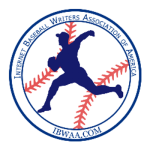
Before looking at my ballot, please keep in mind that the IBWAA already elected players on the current ballot. This includes Mike Piazza and Jeff Bagwell I would’ve voted for them because I don’t play the steroids guessing game.
I also would’ve voted for Tim Raines, but he already received the necessary 75% from the IBWAA. Raines was the second best lead off hitter of all time, and frankly I haven’t seen a good reason to withhold your vote for him. Furthermore, even if the vote doesn’t count towards the BBWAA Hall of Fame ballot, I didn’t want to incur the wrath of Jonah Keri.
As a reminder, here are the criteria I use in Hall of Fame voting. As such, I did not vote for Barry Bonds or Roger Clemens. With that said, here are the players on my ballot:
Junior might’ve been the best player in my lifetime, at least when he was launching home runs in the old Kingdome. When you look at his WAR, he’s only behind Willie Mays, Ty Cobb, Tris Speaker, and Mickey Mantle. If you’re the fifth best ever at a position, you deserve to be in the Hall of Fame.
The average Hall of Fame SS has a career WAR of 66.7, a peak WAR (also known as WAR7) of 42.8, and a JAWS score of 54.7. Trammell’s numbers are 70.4/44.6/57.5. Translation, he’s one of the top SS in major league history. Keep in mind, he is a .285/.352/.415 career hitter with four Gold Gloves, six All Star Game appearances, and three Silver Sluggers.
On top of that, he hit .333/.404/.588 in the postseason. He was also the 1984 World Series MVP. It’s his last year on the ballot. He deserves to be elected.
The narrative on Walker is he’s a Coors Field creation. I get it because he hit an amazing .381/.462/.710 at Coors Field. Those are insane numbers.
Look at it this way. Walker has hit .278/.370/.495 on the road in his career. In his six years with the Expos at the beginning of his career, he hit .281/.357/.483. Reggie Jackson, who was one of the top RF all time, hit .262/.356/.490. On top of this, Walker was a five time All Star with seven Gold Gloves and two Silver Sluggers. He was the 1997 NL MVP. If you’re comparable to Reggie Jackson, you’re a Hall of Famer.
If you look over Kent’s career, his WAR, WAR7, or JAWS doesn’t match-up. The average for second baseman is 69.3/44.4/56.9. Kent was only 55.2/35.6/45.4. He fell short on those terms, but I voted for him anyway.
The issue is Kent was not a good defensive player, but he was a terrific hitter. Amongst second baseman, he’s hit the most homeruns, fourth most doubles, third highest RBI, and the second highest slugging percentage. Overall, he was a .290/.356/.500 hitter with 377 homeruns. He was the second best offensive second baseman to Rogers Hornsby. To me, being the second best offensively at his position was barely sufficient for me to vote for him.
Look, I think postseason excellence should be considered in Hall of Fame voting. Schilling was 11-2 with a 2.23 ERA, a 0.968 WHIP, and a World Series MVP. Bloody sock or not, that is as impressive as it gets.
With that said, I didn’t vote for Schilling due to his postseason success. I voted for him due to his regular season success. Schilling was 216-146 with a 3.46 ERA. 1.137 WHIP, a 8.6 K/9, and a 4.38 K/BB ratio. His K/BB is second best all time. His stats are good enough for a 127 ERA+, which is the same as Tom Seaver. His WAR is 79.9, which is higher than the average WAR for a Hall of Fame pitcher.
Postseason success or not, Curt Schilling is a Hall of Famer.
Speaking of career WAR, Mussina’s career WAR of 83.0 is actually higher than Schilling’s.
Mussina was 270-153 with a 3.68 ERA and a 1.192 WHIP. Those are remarkable numbers considering he pitched his entire career in the AL East during the steroid era. It’s unsurprising he would have an ERA+ of 123. That’s better than Juan Marichal and Nolan Ryan. Mussina bomgs in the Hall of Fame.
Other Notables
I didn’t vote for Edgar, who is a career .312/.418/.515 hitter. My vote for him only partially had to do with him being a DH.
I do believe there is room for a DH to be in the Hall of Fame. No matter how they are characterized, there are two right now: Frank Thomas and Paul Molitor. As these are the only two DH’s in the Hall of Fame, I’m judging Edgar against the two of them.
Edgar had a 147 OPS+, 147 wRC+, .415 wOBA, and a 68.3 WAR.
Thomas had a 156 OPS+, 154 wRC+, .416 wOBA, and a 73.7 WAR.
Molitor had a 122 OPS+, 122 wRC+, .361 wOBA, and a 75.4 WAR.
Now, Thomas and Molitor had the magic numbers. Thomas hit over 500 homeruns. Molitor had over 3,000 hits. Now, this isn’t dispositive, but it counts for something. Molitor also has postseason success hitting .368/.415/.615. He won the 1993 World Series MVP.
I bring this up because Edgar was a better hitter. Every stat but WAR is in Edgar’s favor. Edgar averaged a 3.79 WAR per year to Molitor’s 3.59 per year, so in that respect Edgar is again better. However, by no measure is Edgar better than Thomas. Thomas is better than Edgar in every stat.
Now, normally, I would say Edgar falls in line between Thomas and Molitor, so let him in. However, we’ve only had the DH since 1973. That’s only 42 years, or 27 years (10 year career with five year waiting period) of DH’s even being eligible for the Hall of Fame. With that in mind, I look at Thomas, and not the mean, as the standard.
No, I don’t think it’ll be a travesty if Edgar is elected to the Hall of Fame. Over time as I see better arguments for his inclusion, I may change my mind. However, at this time I think Edgar falls just short for me.
In response to an anticipated counter-argument, no, I don’t think it’s hypocritical that I voted for Kent due to his bat. While I do think defense should count, I have Kent credit for being the second best offensive second baseman ever. As a DH, all Edgar does is hit. Using the same standards, he would have to be the second best hitter ever. He’s clearly not that.
So for right now, I left Edgar off my ballot.
Billy Wagner
I’ll readily admit I’m a fan of Billy Wagner. I respect him. He was awesome. You should read up on him to learn about his perseverance. I really wanted to vote for him, but I didn’t.
Sure, there are amazing stats in his favor. Wagner has the most ever saves for a left handed pitcher. He has a career 2.31 ERA, 0.998 WHIP, and a 11.9 K/9. They are impressive numbers. What’s not impressive is his 28.1 career WAR. That’s lower than Tom Gordon, who is off the ballot, and Lee Smith, who last year received 29.9% in the voting last year.
Overall, I wanted to vote for Wagner on a personal level. However, when the people who are better than you aren’t in the Hall, you shouldn’t be either.
Trevor Hoffman
This was an easy name to leave off the ballot. Looking over the career stats, the only thing Hoffman has over Wagner is his saves total.
Like Wagner, Hoffman’s WAR falls short. Hoffman’s WAR was 28.4. Essentially, you’d be voting for him because he had the highest save total ever when he retired. If that wasn’t good enough for Lee Smith, it shouldn’t be enough for Trevor Hoffman.
Synopsis
Overall, even if this doesn’t count towards the BBWAA vote, I took this seriously, and I tried to justify my votes. Admittedly, Kent was my weakest vote. I still think someone could change my mind on Edgar. I don’t see myself voting for a reliever until Mariano Rivera hits the ballot.

When you think of CBS and its news division, typically, the first name that comes to mind is Dan Rather (depending on your age). Dan Rather was forced into retirement for reporting on a story with insufficient documentation.
Rather thought he had the last great story of his career. He thought he had the smoking gun in what had forever been rumored: George W. Bush never served in the National Guard. Problem is the documents and source of the documents were utterly unreliable. As CBS was embarrassed by the ensuing scandal, it forced Rather out due to his perceived misconduct. Rather tried to sue to, in part, clear his good name. The lawsuit was thrown out.
John Heyman is also a reporter for a CBS owned company. With even less “proof” than Rather had on President Bush, Heyman accuses Mike Piazza of steroids use in his Hall of Fame column:
He should be considered an all-time great — he’s the greatest-hitting catcher ever and the value of having a catcher who’s one of the league’s best hitters is immense — but he’s had to wait a few years surely due to a strongly-held belief he participated in the steroid era. I understand there’s no public evidence he did more than play in the steroid era and looked the part. However, since this isn’t a court of law, the burden of proof is much lower and since it’s only about who is honored, and not who is punished, I held out for now.
Make no mistake about it. Heyman just accused Piazza of using steroids. Whether it is guilt by association or how he looked, he accused Piazza of using steroids. He offered no substantive proof. Additionally, with his voting for Barry Bonds because he was a Hall of Famer before using steroids (because he knows the exact date Bobds started using), he has announced Piazza only had the success he did because of his steroid usage.
If you were on Twitter, Heyman was given several attempts to recant his statements or provide specific evidence to establish Piazza used steroids. He didn’t:
@DanTonkin @RisingAppleBlog looking the part isn't evidence. read it rather than taking risings word for it
— Jon Heyman (@JonHeyman) December 29, 2015
By his reasoning, we can’t understand his writing. In a side note, that’s his fault if everyone seemingly took that as his meaning. I digress. His lack of a response just exhibits a lack of respect for anyone who has questions about his “learned ballot”:
I find it funny when voices on the internet — almost invariably stat guys and folks who only cover the game from a distance — declare which ballots are “strong” or stupid.
**********
[Tom Verducci and Pedro Gomez] are reporters who are willing to take the abuse from the loud and shallow guys on Twitter.
You see Heyman doesn’t cover the game from afar. He’s in the thick of things. Like when he’s in studio or on the phone with WFAN. He knows more than you. If people weren’t so “loud and shallow,” they would understand that. It’s how he knows Piazza used steroids, and you don’t. Nevermind that your knowledge would come from reporters like Heyman. Nevermind that he is withholding the information that would constitute proof.
Perhaps, he’s withholding it because he had insufficient proof to prove Piazza used steroids “in a court of law.” As such, he feels comfortable making this accusation. Here’s the problem. Do you know what the burden of proof is in a court of law? In a court of law, Heyman would need to show it is 51% more likely that Piazza used steroids than he didn’t. Ergo, no one is even half sure he used steroids. By logic extension, Heyman fabricated this story.
As we’ve seen, is it a surprise to anyone that a CBS reporter has leveled accusations against a public figure with underwhelming evidence? By using Heyman’s standards, does he deserve the benefit of the doubt? Using his standards, isn’t it fair to say he fabricates stories?
I would say it is fair to use his logic against him. However, I will make clear that despite the title of this post, I’m not saying he fabricates stories. Rather, I’m specifically saying he has presented no substantive proof Piazza used steroids. I sincerely question whether he has anything linking Piazza to steroid usage. He’s had ample opportunity to provide it, but he still refuses.
That’s a real problem. Writers are tasked with reporting news, not creating rumor and innuendo. When that happens, how are the Heymans of the world any better than TMZ or any other gossip site. We deserve better than that. The Hall of Fame deserves better than that. Mike Piazza deserves better than that. If the same was done to him, Jon Heyman would deserve better than that.
Accordingly, it’s time for Heyman to stop being a loud and shallow gossip mongerer and start being a reporter.
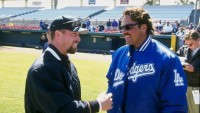
In my opinion, there are three, and only three, acceptable ways to address the PED era:
- Not vote for anyone;
- Vote for everyone eligible regardless of PED usage; or
- Only penalize those people who have been confirmed to use PEDs.
I’m in part three of the camp, but I can accept anyone’s reasonable thought process on the issue. What is not reasonable is playing the steroids guessing game. When you do that, you’re bound to make mistakes. When you do that, you’re bound to be inconsistent and look foolish. Of course, I’m specifically addressing Rick Plumlee’s vote.
https://twitter.com/rickplumlee/status/676894578625105922
Here is his ballot blown-up:
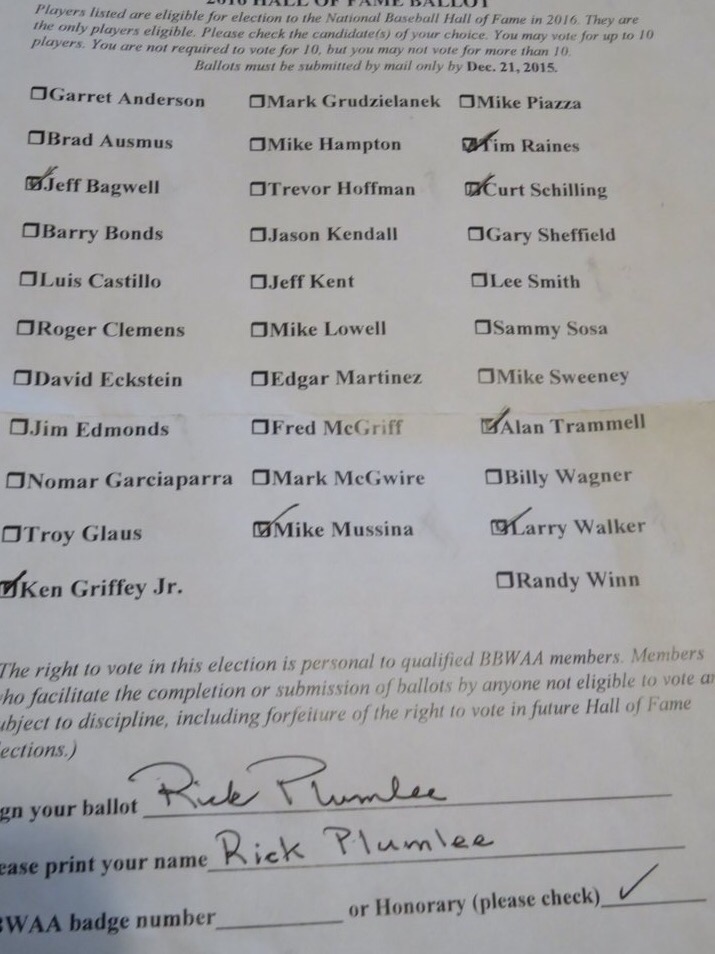
Now, I typically don’t take issue with public ballots. I don’t take issue because there are presumably reasonable and justifiable reasons for not voting for a player. I think Mike Piazza is a sure Hall of Famer, but there could be legitimate arguments why you don’t vote for him.
There could be valid reasons why you would vote for Jeff Bagwell and not Piazza. This is not one of them:
@rickplumlee I see you deleted the Tweet where you reference the "credible case" against Piazza. I was correct. You are a coward.
— Joe Perota (@joeperota) December 15, 2015
https://twitter.com/rickplumlee/status/676904982768189440
Note, I had to include this exchange because Mr. Plumlee deleted his Tweet where he stated there was a “credible case” Piazza used steroids. After deleting his Tweet, he used a Mets Today piece about Piazza admitting he used Andro. That’s his basis. It didn’t matter to him Andro was legal back then:
https://twitter.com/rickplumlee/status/676907078145937408
I could accept not voting for anyone that took anything. He drew a line in the sand, and he used it as a basis to vote for Bagwell but not Piazza. There’s one problem with that . . .
Bagwell made the same admission. You know how I found this Bagwell article? I used what your older relatives refer to as “The Google.” Of course, Mr. Plumlee has not answered any questions why the line of demarcation or why he’s comfortable for voting for a steroid user in Bagwell.
Again, this is why you don’t play the steroids guessing game. Eventually, you vote for a guy who used steroids. You vote for that guy even if the information was readily available.
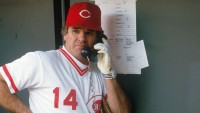
Yesterday, Rob Manfred made the only decision he could make. He denied Pete Rose’s application for reinstatement.
I don’t care if it was as a manger or a player. Pete Rose doesn’t deserve reinstatement, and not just because he was deemed not to have reformed his life. No. Rose doesn’t deserve it for two very important reasons. The first is he bet on baseball as a player and manager. It’s the golden rule. It’s drilled into players from the minors. We all know the repercussions. The precedent was there from the Black Sox scandal. You bet on the game it’s a lifetime ban. You don’t mess with the integrity of the game.
The second reason is the less talked about reason. He agreed to it. At the time, he was being investigated by the IRS and FBI regarding his betting and potential drug use. Yes, as per MLB rules, he had a right to apply for reinstatement, but that doesn’t mean he was promised reinstatement.
How could he? He potentially jeopardized the sanctity of the game. He was completely untrustworthy. He lied until it suited him to discontinue the lie. He perjured himself about his betting on baseball. We know this because later on, he admitted to it when it became profitable to do so. However, he insisted he only bet on the game when he was a manager, and he always bet on the Reds.
Turns out, he did bet on baseball as a player. While nothing has been uncovered about him betting against the Reds, we’ll see. If the right book advance comes along, he might. Regardless, why should we believe him either way? He perpetually lies about it. Perhaps he’s lying about it so he may get elected into the Hall of Fame. Could you imagine the fallout if Rose was reinstated and elected to the Hall only to later discover he was betting against the Reds?
My guess is we will eventually find out he bet against the Reds in some fashion. I don’t know if it’ll be tomorrow, next year, or the next century. We did just confirm he bet on the game as a player 20 plus years later.
There are many who don’t care. They find it absurd the All Time Hits Leader isnt “in” the Hall of Fame. Have these people ever been to Cooperstown? Pete Rose is in the Hall of Fame. They don’t cover up the fact that he has more hits than Ty Cobb. His artifacts are in the Hall of Fame as being the hits leader and being a member of the iconic Big Red Machine. It’s not like Pete Rose was whitewashed from MLB history.
What Pete Rose is being denied is the honor of enshrinement. He’s being denied being inducted as a member. His face is not going to be seen in the sane room as legends like Babe Ruth and Jackie Robinson. He doesn’t belong there. Not in 1989. Not today. Not ever.
No, I don’t subscribe to the put it on his plaque theory. That area of the Hall of Fame is for honoring the best of the best. We don’t see there the worst things about each player. We see what makes them great. That area is for celebrating what made those players great, not to serve as a cautionary tale or to chastise a player. What’s the purpose of honoring him just so you can chastise him?
The better recourse is to prevent his enshrinement. That was his decision. Instead, I’d like to have a young kid go to the Hall of Fame and see Pete Rose is the All Time hits leader. I hope that kid notices Rose was never inducted. I hope that kid finds out why. See? You’ve just accomplished what you wanted to do without excusing Rose’s actions away. You did it without honoring the man who has consistently defiled the game.
Hopefully, this is the last time we will have to hear about this. At least until we discover he has an 0-4 in some random July game or didn’t use his closer in May to satisfy his gambling debts.

Once Michael Cuddyer‘s retirement was confirmed, seemingly everyone sought out the best way to spend his $12.5 million forfeited salary. The prevailing thought was that the Mets should re-sign Yoenis Cespedes. I do admit for a time being the Mets could’ve better spent their money.
These are interesting and worthwhile discussions, but they also neglect the void Cuddyer leaves behind. I know he was slated to make a lot of money. Money, frankly, that could be better spent elsewhere. Put that aside for a second. That money was already budgeted. Instead, let’s focus on the role Cuddyer was going to play:
- Veteran presence in the clubhouse;
- Solid pinch hitter; and
- Right handed bat against tough lefties.
At a minimum, you knew you could slate him in to give Lucas Duda an occasional day off while having a credible bat and glove at first base. He could take some at bats from Curtis Granderson against lefties. Remember, Granderson has definitive platoon splits, and he will be 35 years old next year. He can also ease the transition of Michael Conforto into his role as an everyday player.
Now, many people will naturally call for Juan Uribe to take his place. It seems like a fit. Uribe was a great addition to the clubhouse, and can spell David Wright at third on occasion. Last year, Uribe was uncomfortable playing first, but he may have more aptitude after having an offseason to prepare for the role. He will also cost much less than $12.5 million.
However, Uribe is not the player Cuddyer is or was. Cuddyer is a career .277/.344/.461 hitter. Last year, Cuddyer hit .259/.309/.391. As a pinch hitter, Cuddyer hits .355/.431/.548. Conversely, Uribe is a career .256/.303/.421 hitter. Last year, he hit .219/.301/.430 with the Mets and .253/.320/.417 overall. As a pinch hitter, Uribe has hit .281/.363/.461.
For the money, sure, you’d probably rather have Uribe. However, that first implies the Mets will reallocate the money (not a given). Second, it ignores the fact that Cuddyer also plays the outfield, which Uribe doesn’t. Lastly, Uribe would be redundant as he would just be signing on to play Wilmer Flores‘ role.
No, to fully replace Cuddyer the Mets need a right handed 1B/OF who can serve as a mentor to the players on the team. Looking at the free agent market that player doesn’t exist. Therefore, finding a replacement for Cuddyer will be next to impossible. The Mets are not a better team after his retirement.
I suppose the biggest testament to the type of player and Cuddyer is is noting that the 2016 Mets are worse off for his retirement.

To me Hall of Fame voting gets frustrating because seemingly everyone has a different standard. Worse yet, they believe everyone should adopt that standard.
The first group are the “I know a Hall of Famer when I see him.” I simply don’t get this one because what you see isn’t what everyone else sees. Seriously, we live in a world where Aaron Sele received a vote for the Hall of Fame. When someone tells me Aaron Sele is a Hall of Famer due to the eye test I’m out.
The next is to compare players to the lowest common denominator. For example, there is a Hall of Fame catcher by the name of Rick Ferrell, who as far as I can tell, basically made the Hall of Fane because he caught a lot of games. Long story short, if he and his 29.8 career WAR is your standard, we’re not debating if Mike Piazza belongs in the Hall of Fame. Instead, we’re debating if Tim McCarver belongs in the Hall of Fame.
My favorite is the person who tries to compare players at different positions. Personally, I call this the Don Mattingly defense because that’s where I’ve heard it most often. I’ll hear something like Mattingly had 222 homers while Kirby Puckett only had 207. If Puckett gets in, why can’t Mattingly? The answer is simple having a Gold Glove CF who averages 19 homers is a lot more valuable than a Gold Glove first baseman that averages 20.
Personally, I have no hard set rule. I will say that when analyzing a player’s candidacy for the Hall of Fame, I like to look towards what does the average Hall of Famer look like at that position. It’s not the end all and be all, but it’s a nice place to start. If after looking at that you’re short of that average threshold, there are other things I like to consider.
First is postseason success. If you’ve had real success in the postseason, you should get a bump. Every year, the goal is to win a World Series. If you consistently did something to help your team’s chances, you deserve credit for that.
The next is whether there was something truly great about you. Ozzie Smith wasn’t a great hitter, but he was amazing with the glove. On the flip side, Ryne Sandberg wasn’t a great fielder, but he hit the most ever homeruns by a second baseman when he retired. Being truly great at something and/or being the best ever at something should improve your Hall of Fame chances.
Lastly, I do look at stuff like steroids. I won’t play a guessing game on who did and who didn’t. However, if there’s concrete, actual evidence, I’m not voting for that person. No, I don’t mean a Murray Chase accusation, I’m talking about something that could be substantiated.
Overall, I get to cast my first IBWAA ballot this year, and I’m looking forward to it. I’m sure over time I will learn some things and adapt. I will do a small write-up on whoever is on my ballot.
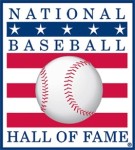
There has been a recent push by the BBWAA to expand the amount of players that can be voted for in any particular ballot.
On the surface, the request is extremely reasonable. They want to eliminate limits or increase the limit on the number of players you can vote for in any ballot. It’s a great argument. If there are 15 players who are truly Hall of Fame worthy, you should be able to vote for 15 players. However, there is a subtext to the request:
Keeping 10-vote limit isn't about tradition. I think it's about suppressing votes for "undesirables" w/out saying it https://t.co/jjBtc1eY0I
— Jayson Stark (@jaysonst) November 18, 2015
The voters really voicing this opinion want the PED guys to go into the Hall of Fame. That’s their prerogative. They have a vote and can do with it as they please. Other voters who disagree can do the same. Looking over last year’s voting, the highest percent of the vote amongst confirmed steroids users went to Roger Clemens with 37.5% of the vote. It seems the overall electorate has spoken on how the PED guys should be treated.
So the 37.5% are really left with a choice. Do you continue to vote for players like Clemens, or do you vote for someone else. Admittedly, it’s not an easy decision. You’re stuck between voting for someone you seem worthy or voting for someone who you deem deserving but may not be as good. For example, do you vote for Clemens or Curt Schilling? Schilling had 39.2% of the vote last year.
The question is how each voter views their job. Is it their job to vote for the 10 best players (assuming there are 10 worthy candidates), or is it their job to elect worthy players into the Hall of Fame? This is probably the first time this has been an either/or proposition. In their history, members of the BBWAA have voted both ways.
There are voters who write-in the name of Pete Rose each year. Why? There is no way Rose can be elected. Even if Rose received a write-in vote on 75% of the ballots, he’d still be ineligible. This is nothing more than taking a stand on principle.
On the flip side, we see voters who vote for players they once deemed not Hall of Fame worthy. Jim Rice went from 29.8% of the vote in his first year to 76.4% in his last year of eligibility. Unlike Bert Blyleven, Rice didn’t have a new statistical approach to the sport to support him. No, it was a separation from his poor relationship with voters as well as superlatives thrown his way like his being a feared hitter.
The person who finished third the year Rice was elected was Andre Dawson with 67.0% of the vote. The next year he was elected with 77.9% in his ninth year of eligibility. The top vote getter not elected was the aforementioned Blyleven with 74.2% of the vote. Behind him was Roberto Alomar with 73.7% of the vote. They would both be elected the next year. It was Blyleven’s 14th year on the ballot and Alomar’s second.
You see the pattern. In fact, anyone who has received over 64.8% of the vote on any year has eventually been elected to the Hall of Fame. Eventually, the voters tend to coalesce around a candidate to get them elected regardless of their prior thought process.
Going back to Clemens and Schilling, for whom should a voter cast their vote? If the idea is to elect candidates who are worthy and can actually be elected, you vote for Schilling. If you follow the Hall of Fame voting patterns, you vote for Schilling. Regardless of how you feel about PED users, is it worth it to block Schilling’s path to the Hall of Fame so you can enter a vote for Clemens?
If you think both are worthy, what purpose does it serve to not vote for Schilling? If you’re complaining there isn’t enough spots, you need to vote for the most electable candidates. If you aren’t, you are effectively acting as a voter who makes a distinction between first ballot Hall of Famers and non-First Ballot Hall of Famers. Effectively, you are saying Schilling belongs in, but only after Clemens makes the Hall of Fame.
If you think someone belongs in the Hall of Fame and they have not been linked to PEDs, you must vote for them. This isn’t limited to Schilling. It incorporates anyone who is on the ballot whether it be Mike Mussina or Mike Piazza. Really, it incorporates anyone you deem Hall of Fane worthy. If there are any spots left, then vote for the Clemenses of the world.
Not voting for Schilling means you subscribe to a tier system in the Hall of Fame; a tier system that does not exist. It has to stop.
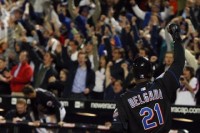
When I was reviewing the 2016 Hall of Fame ballot, one name was conspicuously missing: Carlos Delgado. I knew he retired in 2009 and was never able to play again. I figured it was an error. Nope. Somehow , Delgado only received 3.8% of the vote. How is that possible?
I’m not saying he’s a Hall of Famer. I’m saying it’s up for legitimate debate. Over his career, his 162 game averages were .280/.383/.546 with 38 homeruns and 120 RBIs. THAT’S HIS AVERAGE! Overall, he would finish with 473 homeruns and 1,512 RBIs in 17 years in the big leagues. Look, I know he played in an offensive era, but those numbers are other worldly. I don’t know why 96.2% of the voters couldn’t give him more consideration.
Maybe it’s because he fell one healthy season short of 500 homeruns. Every clean player with 500 homeruns has been elected to the Hall of Fame. Maybe it’s because he spent too much of his career in Canada. Gary Carter seemingly had the same problem, but he had one or two more signature moments with the Mets than Delgado did. Maybe if the Mets win the World Series in 2006 the voters would’ve looked at him differently.
What I do know is Delgado was a feared slugger. When the Mets obtained him in 2006, they went from a .500 club to contenders. Once Willie Randolph slotted him in that cleanup spot, the Mets took off, and Delgado was excelling in his first opportunity to play for a contender. In the 2006 postseason, he went off hitting .351/.442/.757 with three doubles, four homers and 11 RBIs.
I remember him struggling in the beginning of 2008 wondering if this was it for him. He only hit .248/.328/.455 in the first half, and I’m not even sure he was that good. With a .500 team that collapsed the prior year and in need of a spark, especially, with a fired manager, Delgado came in like a raging inferno. In the second half, he hit .303/.386/.606 with 21 homers. He willed the Mets into contention.
Sadly, his career and the stretch of good Mets baseball would end when Delgado needed hip surgery due to bone spurs and a torn labrum. Delgado did not get the chance to go out on his own terms. He deserved better than that much like he deserved more than the paltry 3.8% of the vote he received last year.
In any event, I’m happy Delgado came to the Mets. He retired as one of the top 3 first baseman in Mets history. He may belong to the Blue Jays, but he will always be a Met in my book. Hopefully, the Mets will induct him into the Mets Hall of Fame. It’s not the same as Cooperstown, but it’s something.
Unfortunately, Delgado will no longer be on the ballot. We all lose because of this. We lose because we can’t have intelligent debates over whether or not he belongs in Cooperstown. We lose because we can’t re-live his career highlights. We lose because a great player and a good man was slighted.
There are debates to be had on the players on the 2016 ballot. For the life of me, I can’t wrap my head around the fact that Carlos Delgado isn’t one of them.

Recently, the players eligible for the Baseball Hall of Fame were announced. On that list is former Met, Billy Wagner, who is eligible for the first time.
The question that naturally follows is if he’s a Hall of Famer. Unfortunately, what happens next is some idiot starts minimizing what each player had accomplished, and/or questioning why the player appears on the ballot. There’s no need for that. To be eligible, a player has to be in the big leagues for 10 years, which is no small feat considering most of us never made it out of Little League. These players have earned the right to have their name there. Instead of telling us why they’re not Hall of Famers, their stories should be shared.
Personally, I always marvel at Billy Wagner. Did you know he’s not even a lefty? He’s a natural righty, but as a kid he learned to throw lefty because he broke his right arm twice. It’s a good thing too because inside that left arm was a fastball that could occasionally hit triple digits. He would make it to the Astros to become an elite All Star closer.
For his career, Wagner amassed 422 saves. That ranks as sixth all time and second amongst left handed closers trailing only fellow former Met (and Astro) John Franco. He had a 2.31 ERA with a 0.998 WHIP and a 11.9 K/9. He was what you wanted with a closer. He came in and struck people out en route to wrapping up the game. He made it an eight inning game for his team. You can make a case for him going into the Hall of Fame with those numbers.
As a Mets fan, I’m more interested in two things about Billy Wagner: 2006 and 2009. In 2006, Wagner came to the Mets and became part of an incredible bullpen. He saved 40 games. His year was so good he finished sixth in the Cy Young voting. He was a vital member of a team that won 97 games and won the NL East for the first time in 28 years. Unfortunately, it was his only fully healthy year with the Mets. He was unavailable due to injury in 2007 and 2008. We watched as a damaged bullpen and flawed team collapsed in those seasons.
The worst of Wagner’s injuries would come in 2008. He would need Tommy John surgery. Most, myself included, thought this was the end of his Mets career. Instead, Wagner come back astonishingly fast from the surgery. After 11 months, he came back to a Mets team going nowhere. No one would’ve blamed him for easing off the throttle a bit. There wasn’t a need to rush back. However, it wasn’t the way Billy Wagner is wired. He came back to a well deserved standing ovation and recorded a 1-2-3 inning.
He would be traded to Boston to finish out 2009. He would play one more year with the Braves before hanging them up. He left behind a career in which he was dominant. He can honestly say he gave it all on the field. He was a fierce competitor that brought integrity to the game.
I’m not sure if he’s a Hall of Famer. What I do know is that he was a great player, and I’m glad he was a Met. Instead of taking time to denigrate his career, people should be writing his story. It’s a remarkable story about resiliency and competitiveness. He should be shown as an inspiration to children that you can overcome anything to be a big leaguer . . . even twice breaking your throwing arm.
For all that, congratulations on a terrific career Billy Wagner.